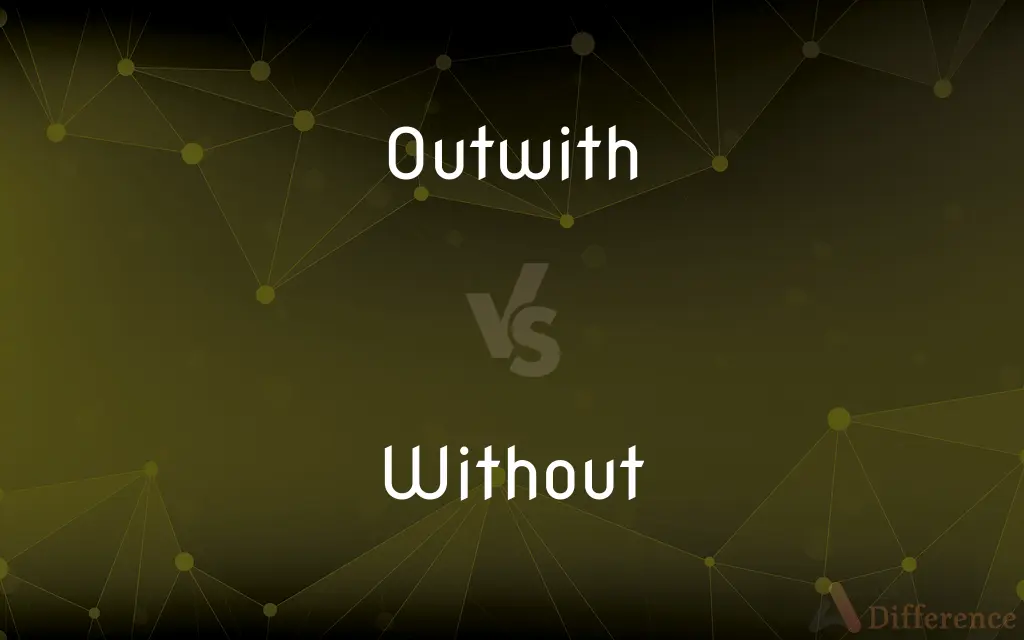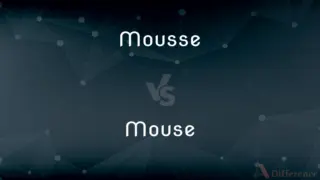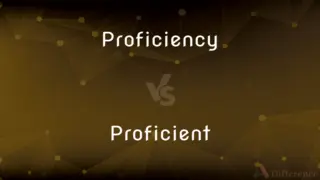Outwith vs. Without — What's the Difference?
By Tayyaba Rehman & Maham Liaqat — Updated on April 27, 2024
"Outwith" is primarily used in Scottish English to mean "outside" or "beyond," while "without" is widely used in general English to mean "lacking" or "in the absence of."

Difference Between Outwith and Without
Table of Contents
ADVERTISEMENT
Key Differences
"Outwith" is a term commonly found in Scottish English, indicating a spatial or metaphorical boundary, like being outside a particular area or group. Conversely, "without" is used across all variants of English to express the absence of something, whether it be a physical object or an abstract concept.
In legal and formal documents in Scotland, "outwith" is often employed to specify something outside the jurisdiction or scope of a particular law, whereas "without" is used more broadly to signify the lack of an attribute, item, or condition.
When discussing geographical locations, "outwith" distinctly notes what lies beyond specific boundaries, such as "outwith the city limits." On the other hand, "without" might be used in expressions like "without a passport," focusing on the lack of necessary items rather than spatial relations.
In everyday conversation in Scotland, you might hear "outwith my understanding," highlighting something beyond one's comprehension. In contrast, "without any understanding" suggests a complete absence of comprehension, emphasizing a void or lack.
For literary and poetic uses, "outwith" provides a stylistic choice that can evoke a specific cultural or regional atmosphere, enhancing the local flavor of the text. "Without," however, is more universally understood and is typically chosen for clarity and broader appeal.
ADVERTISEMENT
Comparison Chart
Usage
Primarily in Scottish English
Common in all English dialects
Meaning
Outside or beyond a boundary
Lacking or in the absence of
Contexts
Geographical, legal, metaphorical
Physical, abstract, emotional
Example Context
"Outwith the city limits"
"Without a doubt"
Tone
Formal, regional
Broadly neutral and versatile
Compare with Definitions
Outwith
Outside; beyond.
The garden lies outwith the boundaries of the property.
Without
Free from; not affected by.
He is without fear when it comes to snakes.
Outwith
Exceeding or not within a particular range.
This issue is outwith my area of expertise.
Without
In the absence of.
He went without lunch to finish the project.
Outwith
Beyond the limits or confines of.
The festival was held outwith the town center.
Without
Not having the use of.
She did the puzzle without any help.
Outwith
Not included within.
Outwith these exceptions, the rules apply to everyone.
Without
Outside of the house; out of doors.
The people came unto the house without.
Outwith
Outside the scope of.
The matter falls outwith the terms of this agreement.
Without
Outside or not within.
They played without the house, enjoying the sunny weather.
Outwith
Outside; beyond; outside of.
Without
On the outside
A sturdy structure within and without.
Outwith
Outside, outwardly; outwards.
Without
With something absent or lacking
Had to do without.
Without
Not having; lacking
A family without a car.
Without
Not accompanied by; in the absence of
Volunteered without hesitation.
Spoke without thinking.
Without
At, on, to, or toward the outside or exterior of
Standing without the door.
Without
An outer position, place, or area
A threat to security that came from without.
Without
Unless
"You don't know about me without you have read a book by the name of The Adventures of Tom Sawyer" (Mark Twain).
Without
Outside, externally. This is still used in the names of some civil parishes in England, e.g. St Cuthbert Without.
Without
Lacking something.
Being from a large, poor family, he learned to live without.
Without
(euphemism) In prostitution: without a condom being worn.
Without
Outside of, beyond.
Without
Not having, containing, characteristic of, etc.
It was a mistake to leave my house without a coat.
Without
Not doing or not having done something.
He likes to eat everything without sharing.
He shot without warning anyone.
Without
Unless, except introducing a clause.
Without
On or at the outside of; out of; not within; as, without doors.
Without the gateSome drive the cars, and some the coursers rein.
Without
Out of the limits of; out of reach of; beyond.
Eternity, before the world and after, is without our reach.
Without
Not with; otherwise than with; in absence of, separation from, or destitution of; not with use or employment of; independently of; exclusively of; with omission; as, without labor; without damage.
I wolde it do withouten negligence.
Wise men will do it without a law.
Without the separation of the two monarchies, the most advantageous terms . . . must end in our destruction.
There is no living with thee nor without thee.
Without
Unless; except; - introducing a clause.
You will never live to my age without you keep yourselves in breath with exercise, and in heart with joyfulness.
Without
On or art the outside; not on the inside; not within; outwardly; externally.
Without were fightings, within were fears.
Common Curiosities
Is "outwith" commonly used in modern Scottish English?
Yes, "outwith" is actively used in modern Scottish English, especially in formal and legal contexts.
Does "outwith" have synonyms in standard British or American English?
In standard British or American English, synonyms for "outwith" could include "outside of" or "beyond."
What are the implications of using "outwith" in an international context?
Using "outwith" in international contexts may lead to confusion unless the audience is familiar with Scottish English, as it is region-specific.
Is "outwith" used in spoken or only in written Scottish English?
"Outwith" is used in both spoken and written Scottish English, though it is more formal and thus more frequent in written form.
Can "without" imply physical absence only?
No, "without" can imply both physical absence and the lack of non-physical qualities or conditions.
In what contexts is "without" most commonly used?
"Without" is used in a variety of contexts to denote the absence or lack of something, ranging from everyday conversation to formal writing.
Can "outwith" be found in texts outside of Scotland?
While rare, "outwith" can occasionally be found in texts outside of Scotland, especially in writings that involve Scottish authors or subjects.
What impact does "without" have on the clarity of a sentence?
"Without" generally enhances clarity by succinctly stating what is absent, making sentences more precise and focused.
How does "without" interact with other words to form phrases?
"Without" commonly forms phrases by directly preceding nouns or gerunds, as in "without reason" or "without going."
What alternatives to "without" are commonly used to avoid repetition in writing?
Alternatives to "without" include "lacking," "devoid of," and "in the absence of."
Are there any literary works where "outwith" is prominently used to establish setting?
Yes, Scottish literature and poetry often use "outwith" to convey settings or themes that are specifically Scottish or to evoke a sense of place.
Can "without" be used in a legal context?
Yes, "without" is often used in legal contexts to specify the absence of a condition or requirement.
How does the use of "outwith" affect the tone of a conversation or text?
The use of "outwith" can give a conversation or text a formal or regional tone, emphasizing its Scottish roots.
How is "outwith" typically taught to non-native English speakers in Scotland?
"Outwith" is taught as part of Scottish English vocabulary, often explained in contrast to more universally understood prepositions like "outside."
Is it grammatically correct to start a sentence with "without"?
Yes, it is grammatically correct to start a sentence with "without," often to emphasize the condition of absence at the beginning of a statement.
Share Your Discovery

Previous Comparison
Mousse vs. Mouse
Next Comparison
Proficiency vs. ProficientAuthor Spotlight
Written by
Tayyaba RehmanTayyaba Rehman is a distinguished writer, currently serving as a primary contributor to askdifference.com. As a researcher in semantics and etymology, Tayyaba's passion for the complexity of languages and their distinctions has found a perfect home on the platform. Tayyaba delves into the intricacies of language, distinguishing between commonly confused words and phrases, thereby providing clarity for readers worldwide.
Co-written by
Maham Liaqat















































